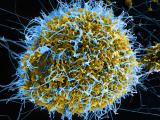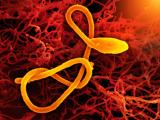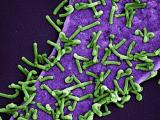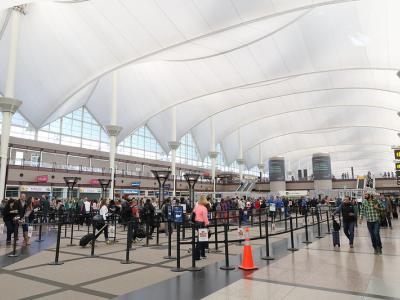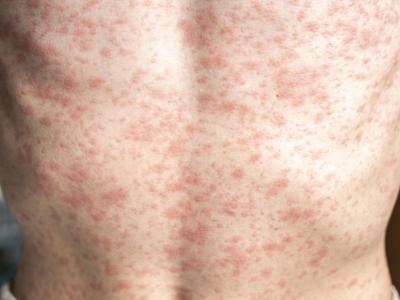Though Ebola patterns look promising in Sierra Leone and Liberia, the number of new confirmed cases spiked in Guinea last week, underscoring tough challenges that remain there, such as gaps in contact tracing and unsafe burials, the World Health Organization (WHO) said today.
For the third week in a row, Liberia reported no confirmed Ebola cases, and cases declined slightly in Sierra Leone, the WHO said in its weekly epidemiologic analysis of the outbreak.
Overall, 150 new confirmed Ebola cases were reported in the outbreak region last week, up from 116 the week before. The number of confirmed, probable, and suspected cases in the three countries has risen to 24,666, with death total increasing to 10,179.
The 12 districts in Guinea and Sierra Leone that reported cases are part of an arc that extends from Conakry to the north and Freetown to the south. The WHO warned that although Ebola's footprint is now limited to a narrow area, the population is mobile, posing the risk or reseeding the disease to other districts and countries.
A spate of health worker infections—11 of them— were reported in those two countries, 4 in Guinea and 7 in Sierra Leone. The new infections boost the cases in healthcare workers to 852, including 492 deaths.
Country statuses vary
Guinea had 95 lab-confirmed cases last week, up sharply from the 58 it had the previous week, the WHO said, adding that the weekly total was the country's highest so far for 2015.
People's reluctance to report illnesses, seek treatment, identify contacts, and safely bury their dead all point to a community engagement challenge that prevents the country from stopping transmission, according to the report. Four districts reported at least one instance of community resistance.
More than half of Ebola deaths last week occurred in in home settings, rather than in treatment centers where patients could have been isolated, diagnosed, and treated. Eighteen unsafe burials were reported, and, in some parts of Guinea, most new cases are popping up from unknown transmission chains.
Sierra Leone's patterns, however, looked more promising last week, the WHO said. The country reported 55 confirmed cases last week, down from 58 the week before and its lowest weekly total since the end of last June.
Other promising indicators are that only 6 of 62 Ebola deaths were detected in community settings last week, and through the first week of March, more than two thirds of confirmed cases were reported in known contacts.
Liberia's last patient had a second negative test for Ebola 15 days ago, but two 21-day incubation periods must pass before transmission is considered to be ended. The country is still investigating suspected cases, with 289 samples tested last week, none of which were positive for Ebola, the WHO said.
More Americans evacuated for monitoring
In related developments, 4 more American health workers were evacuated to the United States for Ebola monitoring, bringing the total to 16, the Associated Press (AP) reported today, citing health officials. All are possible contacts of an American doctor who was sickened by Ebola in Sierra Leone and was recently flown to the National Institutes of Health Clinical Center for treatment.
The sick doctor works with Partners in Health, an international aid group based in Boston. At least 10 of the possible contacts, who are being monitored in proximity to specialized Ebola treatment centers, also worked with the group. In addition, a British health worker who may have been exposed in the same setting was evacuated to the United Kingdom.
So far no other Ebola infections have been detected in any of the potentially exposed contacts.
Ebola's impact on kids
In a report on the impact of the Ebola outbreak on children, the United Nations Children's Fund (UNICEF) yesterday said 20% of the infections in the three hardest-hit countries have been in children and that more than 16,000 kids have lost one or both of their parents to the disease.
The 19-page report also noted that, for the 9 million children living in the three countries, Ebola has been terrifying, with children witnessing death and suffering beyond their comprehension.
The report also outlined some encouraging trends, such as the roles communities are playing in the response, changing attitudes about getting treatment in specialized Ebola treatment centers, and groups stepping in to shore up childhood immunizations, which took a hit during the epidemic.
Gates calls for warning and response system
In a perspective piece today in the New England Journal of Medicine, Bill Gates, cofounder and former chairman of Microsoft who is now a philanthropist and cochair of the Bill and Melinda Gates Foundation, called for a global warning and response system for outbreaks.
"Even if the system we have today had worked perfectly for Ebola, it would fail to contain a more infectious disease," he wrote.
Though the WHO had a global alert and response network, it is severely understaffed and underfunded, he said. He added that other critical needs include strengthening health systems and surveillance, forming a pool of trained personnel who can respond quickly, having transportation and stockpiled equipment to deploy, and developing better data systems to help with reporting disease information and coordinating personnel.
Gates said systems—including a streamlined approval process—are needed to speed the development and delivery of drugs and diagnostic tools in outbreak settings. For example, he said plasmapheresis should have been used in the Ebola epidemic, but its application wasn't approved and scaled up in time to have an impact.
Since influenza is more likely to cause a large epidemic, with even a seasonal variant causing excess deaths, vaccine research is a priority, he emphasized. "So it's disappointing that we don't have a vaccine for all influenza strains. There is work being done toward this goal, but it has garnered nowhere near the resources it deserves."
A global institution could be empowered and funded to coordinate a global warning and response system, Gates wrote, and its formation should include a reserve bench of epidemic experts and military alliances such as NATO, which are adept at using mobile units for speedy deployment.
See also:
Mar 18 WHO situation update
Mar 18 AP story
Mar 17 UNICEF press release
Mar 18 N Engl J Med perspective




